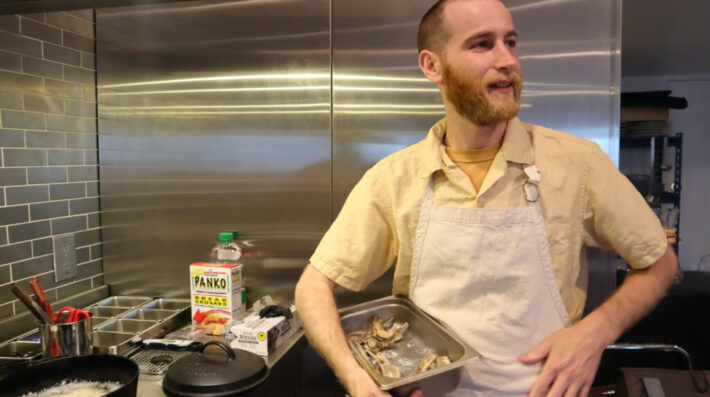Three courses. Two hours. An interview to remember for the rest of my career. Honestly, an interview that further fueled my love for this racket.
I met Max Sheffler some years ago at his father’s birthday party in Highland Park. A group of his father’s friends, including me, mingled among the elevated house on the Eastside hill. His dad, Marc Sheffler, is a world-renowned comedian and actor popularized in the Wes Craven horror classic ‘The Last House on the Left.’ He is one of the original Comedy Store regulars. His T.V. writing and business acumen led him to a fruitful career. Marc is also the inspiration for Max’s culinary spark; a gift he passed down through his own love of cooking. It was a gift that changed Max’s life.
Nearby the throng of laughing partygoers, a fire-pit cooked a massive slab of tender meat. Max set up an oyster bar. It was complete with sauces, utensils, and the promise of a glorious buffet. Marc blew out his candles, opened his gifts, and radiated wise glee. It was a captivating sequence of moments.
Even though his father celebrated his birthday that night, I also happily celebrated the vivacious morsels that Max concocted.
A true chef infuses not only fine ingredients, but their personality into every dish. I had no idea what I was in for in the future, but I knew I needed to cross paths with Max Sheffler’s kitchen mastery again.
The Opportunity
Marc messaged me about Max’s recent move to a private chef agency called Klein Kitchen, a revolutionary and full-scale service that pairs clients with Klein’s rostered chefs. It was founded by Laura and Leor Klein. They are currently making waves in the events and restaurant industry.
My chance arrived weeks after I began my writing position for the Los Angeles Journal. There is something about having a platform and a journalist moniker that unlocks impetus. Goals feel nebulous when there isn’t a nucleus and a strong electromagnetic force of culture binding you.
I asked Marc if I could interview Max and have a demonstration. The same day, Marc gave me Max’s number and an effervescent excitement bubbled through my brain. Max was happy to hear from me and equally as excited. He would prepare three courses and I would interview. My favorite quid-pro-quo: words for food.
Another gift. The day was set.
The Big Day
Thea and I were given the address of his fellow private chef friend’s house in Highland Park. Max gave me a welcoming hug and we went inside. His friend Danny–who they knew since their stint at Providence–lives how he works. His home is half–living area and half–atelier; complete with a commercial dishwasher that cleans a load of dishes in 90-seconds. The stainless steel melds with the quiet neighborhood vista and I felt like I walked into a James Beard award-winning back-of-house.
Danny himself is a dualistic vessel of joy: half-eyes and half-smile. Max is as vibrant as Danny. He offers safety and a confident knowledge about himself. His carefree aura is paradoxically humble and braggadocious. His résumé and pedigree speak for themselves and the following experience is a window with a view matched only by the calm landscape of the Eastside outskirts. By the end of the night, and in a far from hyperbolic sense, my purpose in food writing and my path would be transformed and solidified.
The Interview with Max Sheffler
SM: “Good evening. We are here with Max Sheffler,a Michelin Star-level chef who helped lead some of the West Coast’s hottest restaurants including Providence, Statebird Provisions, and Single Thread Farms. He also co-founded his own restaurant called Chainsaw. He recently joined a boutique private chef service called Klein Kitchen, which matches chefs with clients to cook in the safety of their own home. Welcome, Max!“
MS: Hello!
SM: “Thank you for hosting us. We aren’t at your typical headquarters but we are at another great house. You said your place is in Highland Park as well. Tell me about your setup at home since you are a high-demand chef with Klein Kitchen.“
MS: “Yeah, so right now, it’s pretty much a 50-50 split between a tiny room and a kitchen. I don’t really have a living room. I have an open book in terms of a kitchen where I keep all my gear there, so it is perfect for what I do.”
SM: “You’ve had such an indelible voyage in the culinary world. What drew you to cooking in the first place? I heard it runs in the family.”
MS: “Yeah, my dad is actually an amazing cook. It all started with him I would say. He was always the cook in the house and I was always there with him. In the beginning, I was in denial about it. I wanted to do something with animals or do something else. Cooking is kind of both.”
SM: “You went from wanting to work with animals to eating them.“
MS: “Yeah, you still get to break down the whole fish and see the anatomy. It’s really interesting. Watching him cook made me want to be a chef. “
SM: “What is it about Klein Kitchen that made you inspired to join them?“
MS: “A buddy of mine who was in the same situation I am recommended me. A lot of those agencies are outdated and estate-like in the sense you almost feel butlery, if that makes sense. I feel Klein Kitchen is more modern. They started after Covid and became big. It was perfect timing. They are so cool. The husband, Leor, is a chef from Israel. Laura handles all the gigs and logistics for the client like glassware rental and money. There are a lot of logistics you don’t want to deal with as a chef that they do for you. She handles all the dirty work and we chefs can focus on the food and the dining experience. It’s the best of both worlds with Klein [Kitchen].”
SM: “Klein Kitchen was founded in 2020 at the height of the pandemic. Did the demand to cater to clients in lockdown fuel these private chef services, or is mobile cheffery a rising trend already?“
MS: “I think definitely after Covid it has been rising more. I think that’s why a lot of chefs like myself who’ve been in restaurants their whole lives are seeing the greener pastures. There’s been more free time because I can have a better work-life balance. Being a chef with this agency allows me to do that. I can say yes or no to any job, I can work my ass off for weeks or I can turn down any job and just chill. The sky is the limit money-wise. It isn’t bound to a typical restaurant salary.”
SM: “When you are booked for a dinner, what is the typical day-to-day for you as far as preparation and the experience itself? Since Klein Kitchen has the horizontal integration covered, what do you do on your end?“
MS: “Yeah, so once the price is agreed upon, I usually talk about the menu with the client and once we figure out what they want, I usually need two days to prepare. I’ve done it the day of, which sucks. She’ll [Laura Klein] call me and say “We need a dinner by tonight,” which is stressful but I’ve done that. Normally it’s a week in advance so I hit the farmer’s market. I go to Cookbook a lot, which is in Highland Park on 57th and Figueroa. They get all farmer’s market goods, so they are a savior for the private chef world I would say. Also the Pasadena Farmer’s Market, Santa Monica Farmer’s Market, and the Hollywood Farmer’s Market on Sunday. I would say Cookbook is the best in the country. I always prepare at my place the day before or two days before, and then I arrive at the event ready to go.”
SM: “So I know you started with cooking school, but your first major career move was being a line cook at Providence, which is one of the most renowned restaurants in the world. How did that prepare you for your career and can you tell us about your genesis at those kinds of restaurants?”
MS: “I would say it was the perfect start. I always knew I wanted to cook seafood from an early age. I grew up eating sushi and I love going to Japanese restaurants. One of my life goals was to learn how to cook fish really freaking well. I also looked up the best restaurant in LA. They still pop up on lists. [Providence] is a hard kitchen, like really good people I would say. A lot of kitchens you hear about have nasty people and nasty chefs. I never really got that at Providence. It was led by Chef Michael, Tristan, and Sam who are just good people and they push you in the right direction. They were never nasty but they gave you a good push.”
SM: “Yeah, your morale wasn’t knocked down. You were challenged and knew you needed to work still. Any cool stories from Providence?“
MS: “I have a butter story! Chef Michael reminds me of this every time I see him. In restaurants, there are big things of butter. I was there early in the morning. It was me, the pastry chef, Chef Michael, and the prep cook. Chef Michael wanted to teach me something. He was like “Hey, let’s make truffle butter.” I was like “Sick, let’s do it.” He said, “Cube me up in little cubes four pounds of butter.” I said “No problem!” You know, my logic, you think of little house butter where if you need half of it, you just cut through the paper and take half. That was my logic that day.
I literally cut four pounds of butter with the paper on and I kept going and going. I gave it to him and he’s calling the pastry chef over laughing hysterically. He’s like “What have you done? Now you have to take off all this paper!” He made me unwrap every tiny square of butter and made me count it, which was about 196 pieces of paper. I was a sous chef later on and we’d be eating a family meal, and he would show me a saved Facebook picture that he showed to all his chef homies. It was great! I’m glad I was the butter chef there.”
SM: “That should be a movie title: The Butter Chef. I think the fact they laughed about it instead of condemning you made you feel at home there too. We need that environment. “
MS: “Yes, that was a big thing too. New chefs would come in and they would hear all about it. It was so great. “
We took a break from the interview for the first course of Max’s prix fixe.
Sheffler Prix Fixe: Course One
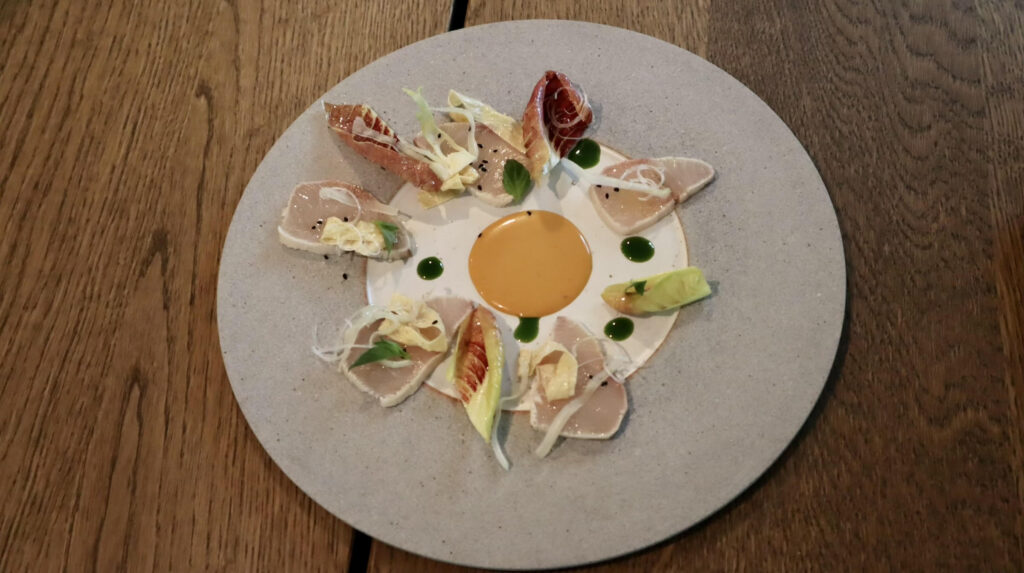
Max describes his plating technique in terms of balance. As long as the plate is balanced and the client’s needs are met, he has carte blanche to plate the dish as he sees fit. Artistic integrity is crucial to his process. He describes his specialty as “funky, farmers’ market fresh, and Asian-inspired. His world travels throughout South Korea, Japan, Vietnam, and more helped congeal his style.
The first course was straight out of Max’s Japanese-seafood-inspired playbook. A wreath of aged buri (fatty yellowtail), circumnavigated a yolky sun of yuba (soy milk skin), and was dotted with sesame vinegarette, chicories, nigela seeds, and basil oil. Max told Thea and me to drag the buri through the yuba, but to also play around the plate.
His exploratory approach is partly how his personality infuses the food he creates. Biting into the aged yellowtail was a bright delight. It wasn’t overly piscene, and the sesame vinegarette offered a buoyant bounce to the palette. We couldn’t get enough. I already knew we were in for quite the meal. We enjoyed the dish with a glass of Vinca Minor 2021, which was a red blend of Carignan, sauvignon blanc and pinot blanc.
Thea and I couldn’t believe how quickly we ate through it. Time to get back into the chat.
Back to the Interview
MS: “Oh yeah, what was the question you wanted to ask before we stopped?”
SM: “Ah yes! Since you were important in the operation of some of California’s finest restaurants, what has your success taught you?“
MS: “As far as management, I try to be the middleman between the cooks and the managers. I always stick up for the cooks and I’m very understanding because I’ve made every single mistake you can imagine in the kitchen. I still do! Sometimes a cook will make a mistake or oversalt and I’ll hit them with a smile and say “Hey let’s do it over,” or “No big deal, we’ve all done that.” Once you start putting other people down at the beginning of a shift, it’s going to snowball and once service comes, it’s going to be a shitshow.
I always try to be the bright spot in the kitchen because if you appear angry and hard, nothing is ever going to work. I’ve learned to be even-keel and always smile in the kitchen. I push others to do so too.”
SM:” Positive reinforcement is best for productivity! So what are some pitfalls you’ve had opening or managing a restaurant?“
MS: “I’ve been part of two openings, but haven’t opened one myself besides in a garage [his old restaurant Chainsaw.] As much planning as you can do, stuff is always going to go wrong. You have to be ready for that, accept it, and make the right decisions in the moment.”
SM: “Can you give an example of when that happened? I’m only asking the hardball questions.”
MS: Hmmm, can we come back to that? That’s a good question.
SM: “Sure! Let’s do a lighter one. Can you run us (the readers) through the Michelin Star rating system?“
MS: “I don’t know the exact definitions but it’s a lot about food, but it’s really not.”
Danny: “I think for one star it is but once you get to two stars, they consider more detail to the service and plate-ware, etc.”
MS: “Three stars are the highest and it means the place is absolutely impeccable. The front-of-house makes it a lifestyle. They basically live there and are trained to know everything about the menu. The front-of-house and back-of-house know equally as much. There’s tableside service like filleting fish. Timing and pace are key too. They have synchronized paths to the table. It’s almost like a dance. Did you hear the rumor that back in the day French Laundry made their team take ballet lessons just to practice being graceful on the floor?”
Yeah. Honestly, though, it’s more of a formula. Not to put it down, but it’s almost formulaic to say “We need these plates, we need duck from this farm on the menu, and we need to have this and that on the menu.” You can follow it but it’s about execution. If you do it properly, it will taste good and be aesthetically pleasing.
SM: Aah, so you need to appease the powers that be in a way.
MS: It’s political in a way.
SM: Interesting! How can the food world be political?
MS: I don’t know if I want to get into it because I don’t want to be a whistleblower (laughs).
SM: Dang, that’s a good idea for another story!
MS: Yeah! To be honest, I’m at the point where I don’t really give a shit about Michelin. I don’t follow it really anymore. I just don’t care. Really any restaurant can get it if you do the right things, have the right things, have the right plates, or if your menu is 300 dollars plus for a three-star place. I don’t really care about it anymore.
SM: Do you feel it saps creativity when chefs adhere to those standards?
MS: Yeah, if you follow the formula to a T, then all the restaurants end up looking the same and homogenized. Would you like to pause for the second course?
Sheffler Prix Fixe: Course Two
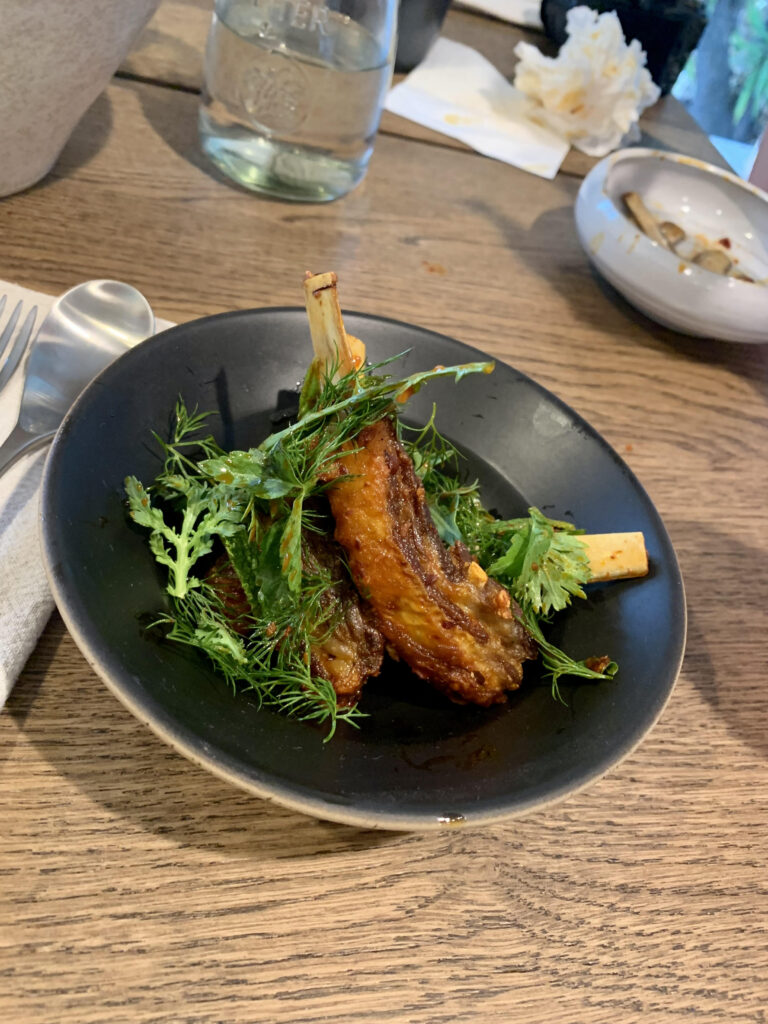
The main course was simply unbelievable. Max called them ‘Sunshine Lamb Ribs,’ which he says stems from how the meat is prepared and dried in the sun. The added Vitamin-D is a magnificent complement with Max’s cheery disposition.
The ‘Sunshine Lamb Ribs” are an oblique take on Southeast Asian lamb jerky. The ribs are braised with Morita chile and red Fresno chiles. He creates the special sauce himself. He garnished the ribs with a bed of minari, mint, dill, and chrysanthemum. The dill and the mint were extroverted, popping through and cooling the smokey, yet mysterious Morita and Fresno chile heat. The tenderness of the lamb caused it to fall straight from the bone into our mouths.
Max’s complexity and competence showed full force with the two bowls of ribs he prepared for us. Thea and I both agreed through stuck smiles that we were probably going to cry in the car after eating something that scrumptious. There was even an undercurrent of floral subtlety from the chrysanthemum, which held hands with the rest of the herbs. It was a romance of meat and vegetation I didn’t know I needed in my life until it happened. Going back to the interview seemed almost unfair. I wanted to live in these dishes.
The show must go on. Heaven can wait.
Interview Pt. 3
SM: “Klein Kitchen is interesting because it is face-to-face, you are in their space, and I’m sure it’s quite the intimate atmosphere. What are your clients like? What is it like to get to know them?“
MS: “Great question! Between dinner and events, the clients are blown away. We’re bringing a restaurant to their home. They’re in the kitchen with me sometimes. I have a client whose daughter is getting into the restaurant world, so she’s in the kitchen helping us run, bringing dishes to guests, and it is always a joy teaching her stuff.”
SM: “It’s like you’re inspiring the next generation of chefs! No matter what, you have a legacy. So why do you enjoy events more than private dinners?“
MS: [“Events] allow me to be more creative. Of course, if you’re cooking for a single client every week or multiple times a week, you can’t always make sunshine lamb ribs. Sometimes they want super homey cooking and that’s fine, but I can’t always get my creative juices flowing. I like to do one party banger. It’s more fulfilling than cooking for a single family. Also, there are fewer dietary restrictions, and events are much more celebratory. I want to try to make something they haven’t had before and are not used to. I’m still honing my style. It’s about reading what they want and putting my touch on it.
SM: “Oh, so how does Klein Kitchen match clients with the chefs? Has there been a time when clients have been unhappy with your work?“
MS: “Another good question! So far, no, everyone has been excited about my food. It will come though. I’m not perfect. I’ve overcooked before and I will again. So far, it hasn’t happened, knock on wood. I like hearing the good reports from Laura.”
As far as matching clients to chefs, Laura has many chefs that work for her. She has a go-to Japanese chef, sushi chef or she has a chef who is really good with pasta. She feels out what the client wants and then reaches out to the chef with that specialty. It also depends on the price point too. Chefs won’t always work for certain amounts but others will take it. It is a good system.
SM: “That’s a great amount of time for a workday. There’s a lot of balance there. Since you have helped run restaurants, what does a successful restaurant need to succeed? What are the core values of a timeless restaurant?“
MS: “I think having a good staff behind you is crucial. With Providence, the upper management has been there since day one. If you weren’t there since day one, you’ve been working there for years. A lot of people go in and out of restaurants. People stay at Providence, for a long time. If you do leave, you come back. I left and came back and so many other cooks I know came back. The food has to be good obviously. The menu has to change but you need to keep items that are classics. For Statebird Provisions, we had the fried dough garlic bread always on the menu. You want to give people a reason to come back.
Danny: “Yeah, reading the room and your demographic is important. Luck is a variable. Returning customers are crucial because if they only come once a year, it doesn’t help.”
We took our final break for the dessert portion.
Sheffler Prix Fixe: Course Three
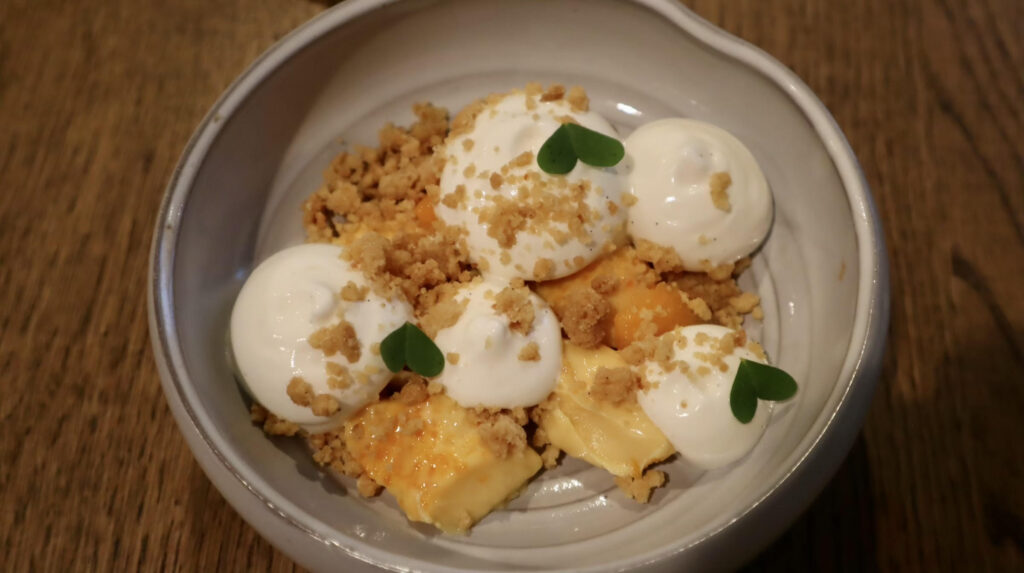
The denouement of the night rested in the air of the camaraderie we shared with each other and also in a bowl. Max’s dessert was as solar as the rest of the courses. It was a splendid thread tying the experience together. He prepared a “deconstructed pie” of frozen tangelo curd, Strauss yogurt and vanilla bean. A highly tactile crumble and Max’s tableside citrus zest topped it and the blend was the heaven I waited for.
The Strauss yogurt whip was a cumulus puff that sheltered the tart tangelo from too much exhibitionism. The tangelo curd itself was soft, confident, and expansive like the marshmallow giant from ‘Ghostbusters.’ Max explained he also makes it with passionfruit, which is an interesting choice and obviously one I will have to devour later.
The layers of texture and flavor orchestrated across our senses and performed a cleansing dance across Thea and I’s minds. It was an eye-rolling and a spectacular finish. I told Max after eating it that the worst part of the entire meal was the fact I had to return to lesser food afterward. You don’t review a prix fixe such as that. You simply narrate what you felt. We were interactive spectators with no reasons to complain.
As Max gathered the dishes and prepared for our last interview segment, Thea and I talked about how eye-opening the night was. We ate cranium-cracking cuisine, had a dialogue with an equally passionate pair of private chefs, and it was all in the name of journalism and spreading the gospel of word and wine. I told Thea that I felt truly at home in these environments, and if I was able to have remarkable conversations with down-to-earth and out-of-this-world people, I could craft my entire purpose in writing.
I could explore the world of L.A. dining in every niche, every nook and every stab of the fork the way I wanted. It seems obvious to anyone already among my peers, but the interview became my ignition to the opportunities in front of me. I felt unstoppable and emboldened. I feel the beauty of this tenure is not only the discovery of the finest foods but also the finest self. That epiphany is something I could actually take to go.
Final Part of the Interview
SM: “Are there any nightmares you have as a chef?“
MS: “I think you can agree with me, there is always this fear of not being prepped in time for service. I still have those dreams of my mise en place not prepped in time for service. The dream is a shitshow. It is 4:59 (p.m.), the doors are about to open, none of your prep is done and you are scrambling. We have all been in that position and that is the worst nightmare as a cook. It takes ten years to be a badass and to be prepared like that where you wait with knuckles down at 4:58 (p.m.)”
One of my mantras in the kitchen is, “I’m not dying. I’m not saving anyone’s life. It’s just food.”
SM: “I’m definitely putting that in the piece! One of the last questions I want to cover is: Do you have any accomplishments you still want to achieve in your career?“
MS: “Yeah, actually I’m working on a pop-up sandwich place that is opening in June or sometime this summer. If I opened a restaurant, it would be a one-item or two-item menu. A lot of that is like when you go to Japan, you go to the ramen shop or the unagi shop. They’ve perfected one thing, which is fucking cool. The pop-up place I’m doing will just have one sandwich and a couple of sides.”
In the summer of 2020, I was doing lunchboxes with sides, a dessert, and a sandwich. The meat was inspired by a restaurant I worked for in Oakland called Camino. We used to grill full pieces of pork shoulder or leg and slice them up. We were always taught it was only to be braised but I cooked it on the grill and it’s some of the best meat ever. No one else does that. There’s some finely shredded lettuce, scallion on top, farmers’ market tomatoes, cherrywood smoked and deep-fried fingerling potatoes, and garlic aioli. It’s super simple. I’m doing one pop-up to see how it goes.”
SM: “Wow that sounds amazing! Do you have a name for it?“
MS: “I might call it ‘Dog Days,’ like the dog days of summer. Nothing to do with my dog (laughs). I was working with summer synonyms because a lot of the ingredients I have are grown in the summer. Also, Canis Major shows up in the sky during that time when it is about to get really fucking hot. It may just be my name, but we’ll see.”
SM: “I like ‘Dog Days!’ Will it be in Highland Park?”
MS: “It’s actually going to be at Brain Dead Studios on Fairfax. You should definitely come!”
SM: “I absolutely will and maybe even do a story! Any last words for our readers?“
MS: “Cheers! Please hire me (laughs). The private chef world is different and I’m putting my own style on it. I don’t want to adhere to what private cheffing is now. I’m going to keep doing my funky dishes and give my guests something different.”
SM: “Thank you so much for the time and the food. It was amazing!“
MS: “It was my pleasure! Thank you.”
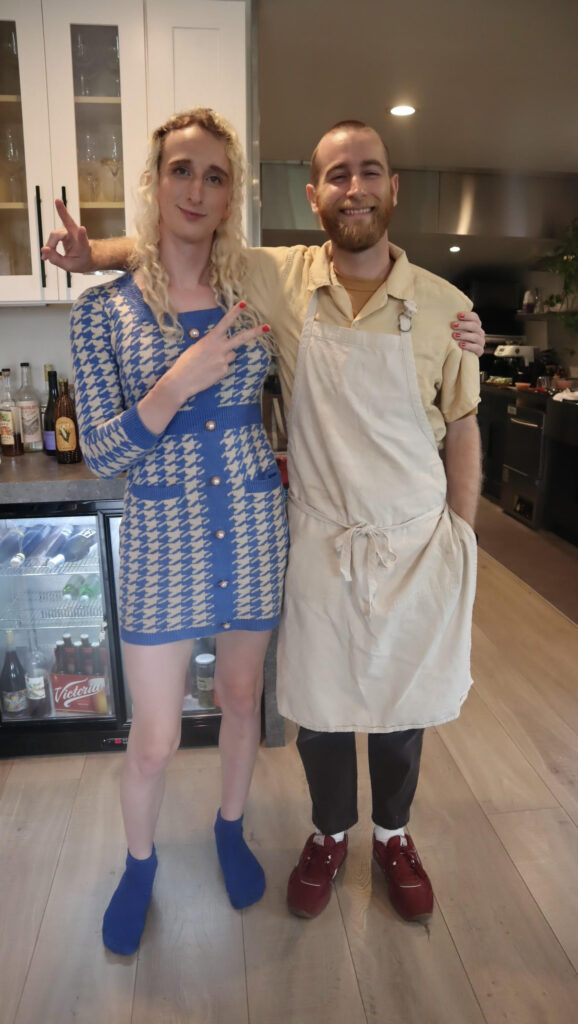
You can contact Max Sheffler through Klein Kitchen by going to http://kleinkitchen.com or his Instagram handle @Whales___. Look out for ‘Dog Days’ in June.
Follow Savannah Manhattan on Instagram @savannahmanhattan.

